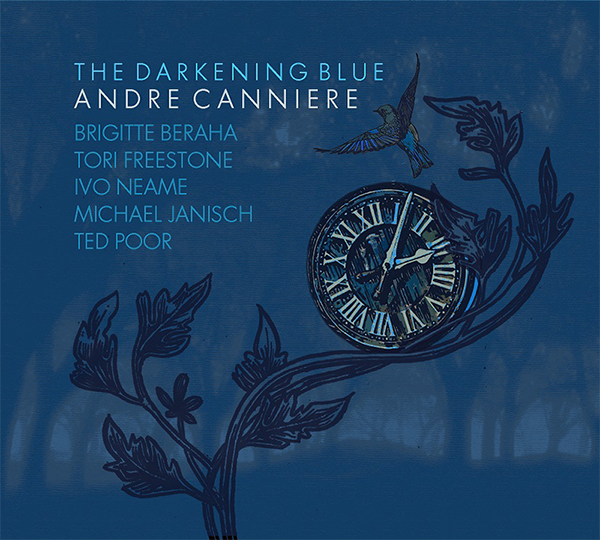
by Sean Wilkie
October 21, 2016
/ LIVE
Guest contributor Sean Wilkie enjoys the music of trumpeter Andre Canniere's new sextet as they perform material from the new album "The Darkening Blue", inspired by the poetry of Rilke and Bukowski.
Andre Canniere’s The Darkening Blue
Dempsey’s, Cardiff 19 October 2016
Jazz and poetry make interesting bedfellows. Which of these cultural heavyweights attracts the smaller audience? Upstairs at Dempseys in Cardiff, on a chill Wednesday evening in October, I was pleasantly surprised to discover a warm and relatively healthy audience, who listened appreciatively to American trumpeter Andre Canniere lead the sextet of musicians through performances of all the pieces on his “The Darkening Blue” album, music mostly inspired by the poetry of Rainer Maria Rilke and Charles Bukowski, themselves another pair of interesting bedfellows.
Canniere has played in Dempsey’s several times before: most recently, only last month with bassist Henrik Jensen’s Followed By Thirteen. With a strong student presence in the house this week, the turnout was perhaps three times that which had enjoyed the music of Jensen’s all-too-appositely-entitled ensemble. If I recall little of Canniere himself from that September evening, this is testament partly to the impression made that night by Jensen, his pianist and drummer, but largely down to the effect of hearing Swiss trio Vein the following evening. My impression of a European-style, clean-not-bluesy, classical-but-not-brassy, trumpet player is chiefly evidence of my own slapdash and sometimes unhelpful way of categorising things, and Wednesday’s concert helped to expand upon that thumb-nail sketch, showing us how much more there is to expressive trumpeting than vocalised growlings or overblowing.
Although he is professedly lacking in some of the technical skills and know-how required of bandleaders – such as using a microphone to speak to the audience (unnecessary at Dempsey’s, in any case, which he might have known) – the role allows Canniere to share his passion for the work of these two contrasting poets. We’re offered a handout containing copies of eight poems; and even a swift perusal of Rilke’s “Going Blind”, as Tori Freestone on tenor sax warms up the brisk, cantering rhythm laid down by drummer Andrew Bain, greatly helps me to follow singer Brigitte Beraha’s delivery of the poem (in English translation by Stephen Mitchell) and to laugh at the funny bits.
I can’t speak to the vocal content of the opening piece, “Autumn Day”, but for the rest of the evening, the Rilke translations are set as lyrics, while Bukowski’s poems seem to be harnessed more loosely to the music, even where it does contain lyrics deriving from the content of the poem, as with the moving “Bluebird”. Canniere twice reads the American’s poems before playing the music they inspired: when he does so for “Hug The Day”, the second piece performed after the interval, it averts any puzzlement that might have been felt at the musical passion and fury which subsequently erupts in the upstairs room.
Saxophonist Tori Freestone is a wise choice for the band and a firm favourite with the audience, many of whom will have heard her leading her own trio here three weeks earlier. She plays with great sensitivity and passion, sometimes both at the same time, and yet, above all that, it is her thoughtfulness as a player which so well suits her playing to music embodying poetry. Vocalist Beraha seizes the opportunity provided by Canniere’s takes on Bukowski, to deploy a range of extended vocal techniques: on “Hug The Day”, for example, she improvises with syllables in a fashion I’ve previously heard only from Lauren Kinsella.
Bassist Michael Janisch begins to come to the fore when he switches to the electric instrument for a powerful and very funky instrumental piece that closes the first set, and he seems more prominent, if no less tasteful, throughout the second set, despite returning to the upright acoustic. Pianist John Turville (touring in place of Ivo Neame, who plays on the album) completes the sextet: and although, like Janisch, he shines when featured on the electric instrument, he spends most of the gig playing the fine-sounding Kawai grand piano on which he is heard to increasing effect during the later stages of the second set.
When Canniere explains that they are playing the entire “Darkening Blue” album in sequence, Turville jokes that all the solos will be exactly the same and some wag in the audience opines that it is normally 25 years before such concerts occur, and then only after the individual band members, following their accountants’ advice, have made up their musical differences. But aside from a brief moment of confusion in the night’s opening song, when Freestone cannot reconcile her melodic line with the chords being played by Turville, there is nothing in the night’s music that suggests any such differences, and I leave the venue wondering whether the music has rendered Rilke and Bukowski to me as complementary more than contrasting.
Sean Wilkie
Canniere and his group are currently touring the UK with forthcoming dates as follows;
25 October 2016 - PARRJAZZ, Liverpool
26 October 2016 - The Lescar, Sheffield
27 October 2016 - SoundCellar, Poole
10 November 2016 - RamJam Club, Kingston
22 November 2016 - E17 Jazz, Walthamstow
1 December 2016 - Future Inn, Bristol
16 December - JATP Jazz, Bradford